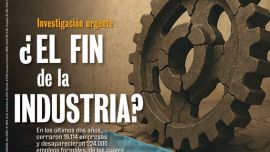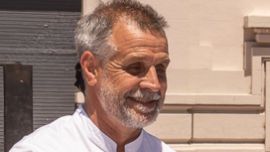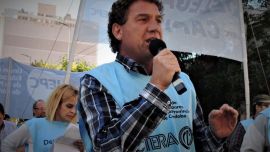PRIMARY SHOCK
Last Sunday’s PASO primaries ended in the totally unexpected victory of libertarian deputy Javier Milei while more predictably former security minister Patricia Bullrich beat Buenos Aires City Mayor Horacio Rodríguez Larreta for the Juntos por el Cambio presidential nomination by almost six points. But the differences were minimal with percentages of 30, 28.27 and 27.27 for Milei, the opposition and the government (trailing in third place) respectively (at the time of writing). Milei won 16 of the 23 provinces, all inland. Buenos Aires Province Governor Axel Kicillof finished just three points in front of the combined votes of his Juntos por el Cambio rivals Néstor Grindetti and Diego Santilli (with the former just ahead to clinch the gubernatorial nomination) while in this city Jorge Macri edged Radical Senator Martín Lousteau by 1.5 percent to lay claim to the official mayoral nomination with a pool of 55 percent of the votes for the October general election. Economy Minister Sergio Massa won almost 80 percent of the Peronist vote over social activist Juan Grabois to confirm the Unión por la Patria presidential nomination. Turnout was 69 percent.
MAXI-DEVALUATION
Even before last week’s money markets opened, the exchange rate had been devalued approximately 22 percent from 270 to 350 pesos per dollar, thus topping the preferential exchange rate of 340 pesos for maize and regional economies in force until the end of this month. The initiative, reportedly aimed at ensuring next week’s remittance of at least US$7.5 billion by the International Monetary Fund (IMF), predictably triggered price mark-ups galore throughout the week while the parallel exchange rate, which included some downward oscillations due to profit-taking neared 800 pesos at times but our press times prevent us from giving the exact numbers when the markets closed yesterday.
JULY INFLATION BELOW EXPECTATIONS
Last month’s inflation was 6.3 percent for an annual inflation rate of 113.4 percent and 60.2 percent so far this year, the INDEC national statistics bureau reported on Tuesday, although the major devaluation at the start of the week may make it difficult to avoid double digits this month. The figure was below the 7.3 percent posted for July by City Hall as well as the forecasts of most private consultants. The key item of food and beverages was again below average at 5.8 percent with double-digit increases coming from communications (12.2 percent) and recreation and culture (11.2 percent). Core inflation (excluding regulated and seasonal prices) was 6.5 percent. The “blue” dollar reached 730 pesos that day.
IMMINENTLY MORE FINANCING?
It was revealed in the course of the week that the International Monetary Fund has contacted both last Sunday’s PASO primary winner Javier Milei via his sister Karina and deputy Luciano Laspina, the chief economic reference of Juntos por el Cambio presidential candidate Patricia Bullrich. Meanwhile it was confirmed that Economy Minister Sergio Massa would be flying out to Washington on Tuesday in the hope of returning the next day with US$8 billion following the approval of a meeting of the IMF board of directors that day.
BEEF EXPORTS SUSPENDED?
One government reaction to the price surge following Monday’s post-electoral devaluation was to suspend meat exports for a fortnight while seeking to negotiate price restraints with the industry to ensure a sufficient volume of supply at moderate prices for the domestic market, Customs director Guillermo Michel announced on Tuesday, warning that there would be no export permits unless agreement was reached. Nevertheless, the suspension of exports was denied shortly afterwards by Agriculture Secretary Juan José Bahillo, thus causing confusion. Even ahead of Bahillo’s statement the move had been rejected by farming lobbies. Last Tuesday the prices of beef on the hoof rose almost 30 percent in an immediate reaction to the devaluation. The decision was immediately rapped by newly anointed Juntos por el Cambio presidential candidate Patricia Bullrich, who asked her rival candidate Economy Minister Sergio Massa how the dollars so sorely needed were going to be obtained if exports were not allowed.
ALBERTO IN PARAGUAY
President Alberto Fernández last Tuesday attended the inauguration of his Paraguayan colleague Santiago Peña in Asunción, succeeding Mario Abdo Benítez. “I cannot help thinking that administering the Hidrovía (Paraná-Paraguay waterway) implies delicate processes of equilibrium between the integration and sovereignty of our peoples. We cannot be satisfied but must advance with courage and greater determination,” remarked Peña (a centre-right politician even though his Argentine mother is a descendant of Alfredo Palacios, the first socialist deputy to be elected in the Americas) to his future colleagues, including Gabriel Boric (Chile), Luis Arce (Bolivia), Luiz Inácio Lula da Silva (Brazil) and Luis Lacalle Pou (Uruguay), as well as President Fernández, who arrived on Monday night. But the latter was not the only Argentine politician to be received by Peña, who held a one-on-one meeting with ex-president Mauricio Macri, exchanging opinions on “the challenges in our region and the importance of working towards a common horizon of prosperity,” according to Paraguay’s new leader. Accompanied by first lady Fabiola Yáñez and Foreign Minister Santiago Cafiero among others, the president found this important regional protocol event a welcome and legitimate escape from facing the aftermath of last Sunday’s adverse PASO primary and the subsequent devaluation.
MILEI WOULD SHUTTER CONICET
Libertarian presidential candidate and PASO primary victor Javier Milei ratified last Wednesday that his drastic cuts in state spending would include the elimination of the Conicet research council and the Science, Technology & Innovation Ministry currently headed by Daniel Filmus, a proposal strongly rejected by the government, the Juntos por el Cambio opposition and scientists alike. In Milei’s opinion, science should be privatised like almost everything else with scientists earning their keep by producing "goods of better quality at better prices," especially hi tech exports, upping their productivity. Filmus responded that if the knowledge industry now ranks third among Argentine exports, this was in large measure due to Conicet and his ministry. Scientist Sandra Pitta, aligned with Juntos por el Cambio, defended CONICET, arguing that it needed to be optimised, not closed down, while CONICET workers cited vaccines against Covid-19 as an argument for state-funded research, which it described as essential for export diversification.
FLIGHT CHAOS
A strike by the luggage-handlers of the private airlines JetSmart and Latam starting on Monday afternoon and lasting more than 20 hours resulted in the cancellation of 40 flights affecting more than 10,000 passengers before Labour Ministry intervention on Tuesday morning led to the stoppage being lifted in favour of dialogue with the companies. But the troubles were not over – irate passengers, many of whom had stayed overnight at the airports, staged pickets at the Customs area of Ezeiza Airport complaining that their baggage was not being returned. More aviation turmoil returned on Thursday when more than 50 flights were cancelled amid heavy thunderstorms.
CHARLY GARCIA’S HEALTH ISSUES
Rock legend Charly García was back home in midweek after three days in hospital for studies, sending a message to his fans: "Thanks for worrying." The studies at the Instituto Argentino del Diagnóstico y el Tratamiento on the initiative of his wife Mecha were described as routine with his health reportedly neither better nor worse than before. The musician, who will turn 72 in October, has been largely confined to a wheelchair for the last three years with health problems stretching back for more than a decade. His last stage appearance was four Augusts ago before the coronavirus pandemic, since when he has been largely housebound.

















Comments